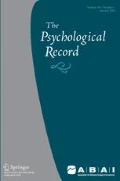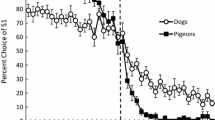Abstract
The interconnection of repertoires is a behavioral process related to problem solving and creativity. Experiments on this topic have mostly used a single reinforcer type during training. Reinforcers have an integrative effect on the emergence of new behavior; however, this assumption was never directly tested in procedures that result in the emergence of the interconnection of repertoires. To test this, six pigeons learned to: (1) push a box towards a light and (2) climb a box and peck a target. After training, pigeons were exposed to the box displacement test, a problem situation that required both behaviors to be solved. Two birds were trained with food as reinforcer for both repertoires (control condition [CC]), and four birds (experimental condition [EC]) had food as reinforcer for repertoire (1), and water for (2). CC birds solved the test in its first presentation, but EC birds did not. Birds that failed the test twice received a retraining of both repertoires, using only food as reinforcer. Half of the pigeons who received this retraining solved the task in a third trial. All pigeons that solved the task (n = 4) were given variations of the task consisting of introducing new stimuli, which, when physically similar to the functional stimuli, hindered the solution. These data indicate that the reinforcer has a similar integrative and discriminative function during the interconnection of repertoires as observed in other behavioral processes related to emergent behavior. The implications of these findings for research on creativity are discussed.

Similar content being viewed by others
References
Andronis, P. T., Layng, T. V. J., & Goldiamond, I. (1997). Contingency adduction of "symbolic aggression" by pigeons. Analysis of Verbal Behavior, 14, 5–17. https://doi.org/10.1007/BF03392913.
Carvalho Neto, M. B., Barbosa, J. I., Neves Filho, H. B., Delage, P. E. G. A., & Borges, R. P. (2016). Behavior analysis creativity and insight. In J. C. Todorov (Ed.), Trends in behavior analysis Vol. 1 (pp. 48–80). Brasília, Brazil: Technopolitik.
Cook, R., & Fowler, C. (2014). “Insight” in pigeons: Absence of means–end processing in displacement tests. Animal Cognition, 17, 207–220. https://doi.org/10.1007/s10071-013-0653-8.
Dube, W. V., McIlvane, W. J., Mackay, H. A., & Stoddard, L. T. (1987). Stimulus class membership established via stimulus-reinforcer relations. Journal of the Experimental Analysis of Behavior, 47, 159–175. https://doi.org/10.1901/jeab.1987.47-159.
Dube, W. V., McIlvane, W. J., Maguire, R. W., Mackay, H. A., & Stoddard, L. T. (1989). Stimulus class formation and stimulus-reinforcer relations. Journal of the Experimental Analysis of Behavior, 51, 65–76. https://doi.org/10.1901/jeab.1989.51-65.
Edwards, C. A., Jagielo, J. A., Zentall, T. R., & Hogan, D. E. (1982). Acquired equivalence and distinctiveness in matching to sample by pigeons: Mediation by reinforcer-specific expectancies. Journal of Experimental Psychology: Animal Behavior Processes, 8(3), 244–259. https://doi.org/10.1037/0097-7403.8.3.244.
Epstein, R. (1985a). Animal cognition as the praxist views it. Neuroscience & Biobehavioral Reviews, 9, 623–630.
Epstein, R. (1985b). The spontaneous interconnection of three repertoires. The Psychological Record, 35, 131–141. https://doi.org/10.1037/h0048509.
Epstein, R. (1987). The spontaneous interconnection of four repertoires of behavior in a pigeon (Columba livia). Journal of Comparative Psychology, 101, 197–201. https://doi.org/10.1037/0735-7036.101.2.197.
Epstein, R. (2015). Of course animals are creative: Insights from generativity theory. In E. A. B. Kaufman & J. C. Kaufman (Eds.), Animal creativity and innovation (pp. 375–90). London, UK: Academic Press.
Epstein, R., Kirshnit, C., Lanza, R., & Rubin, L. (1984). “Insight” in the pigeon: Antecedents and determinants of an intelligent performance. Nature, 308, 61–62. https://doi.org/10.1038/308061a0.
Hartmann, G. W. (1933). Insight vs. trial-and-error in the solution of problems. American Journal of Psychology, 45, 663–677. https://doi.org/10.2307/1416194.
Honig, W. K., & Urcuioli, P. J. (1981). The legacy of Guttman and Kalish (1956): Twenty-five years of research on stimulus generalization. Journal of the Experimental Analysis of Behavior, 36(3), 405–445. https://doi.org/10.1901/jeab.1981.36-405.
Iversen, I. H., Sidman, M., & Carrigan, P. (1986). Stimulus definition in conditional discriminations. Journal of the Experimental Analysis of Behavior, 45(3), 297–304. https://doi.org/10.1901/jeab.1986.45-297.
Köhler, W. (1948). The mentality of the apes. London, UK: Penguin Books (Original work published 1917).
Luciano, C. (1991). Problem solving behavior: an experimental example. Psicothema, 3(2), 297–317.
Maier, N. R. F. (1931). Reasoning and learning. Psychological review, 37, 332–346. https://doi.org/10.1037/h0069991.
Megibow, M., & Zeigler, P. H. (1968). Readiness to eat in the pigeon. Psychonomic Science, 12(1), 17–18. https://doi.org/10.3758/BF03331166.
Neves Filho, H. B., Stella, L. R., Dicezare, R. H. F., & Garcia-Mijares, M. (2015). Insight in the white rat: Spontaneous interconnection of two repertoires in Rattus norvegicus. European Journal of Behavior Analysis, 16, 188–201. https://doi.org/10.1080/15021149.2015.1083283
Neves Filho, H. B., Carvalho Neto, M. B., Taytelbaum, G. P. T., Malheiros, R. S., & Knaus, Y. C. (2016). Effects of different training histories upon manufacturing a tool to solve a problem: Insight in capuchin monkeys (Sapajus spp.). Animal Cognition, 19, 1023–1045. https://doi.org/10.1007/s10071-016-1022-1.
Neves Filho, H. B., Knaus, Y. C., & Taylor, A. H. (2019). New Caledonian crows can interconnect behaviors learned in different contexts, with different consequences and after exposure to failure. International Journal of Comparative Psychology, 32, 1–16.
Ruiz, G., & Sánchez, N. (2014). Wolfgang Köhler's The Mentality of Apes and the animal psychology of his time. Spanish Journal of Psychology, 28, e69. https://doi.org/10.1017/sjp.2014.70.
Schenk, J. J. (1994). Emergent relations of equivalence generated by outcome-specific consequences in conditional discrimination. The Psychological Record, 44, 537–558. https://doi.org/10.1007/BF03395143.
Shettleworth, S. J. (2012). Do animals have insight, and what is insight anyway? Canadian Journal of Experimental Psychology/Revue canadienne de psychologie expérimentale, 66(4), 217–226. https://doi.org/10.1037/a0030674.
Sidman, M. (2000). Equivalence relations and the reinforcement contingency. Journal of the Experimental Analysis of Behavior, 74, 127–146. https://doi.org/10.1901/jeab.2000.74-127.
Sidman, M., Rauzin, R., Lazar, R., Cunninghan, S., Tailby, W., & Carrigan, P. (1982). A search for symmetry in the conditional discrimination of rhesus monkeys, baboons and children. Journal of the Experimental Analysis of Behavior, 37, 23–44.
Silveira, M. V., Mackay, H. A., & de Rose, J. C. (2018). Measuring the “transfer of meaning” through members of equivalence classes merged via a class-specific reinforcement procedure. Learning & Behavior, 46, 157–170. https://doi.org/10.3758/s13420-017-0298-6.
Stricker, E., & Woods, S. (2004). Handbook of behavioral neurobiology. Vol. 14: Neurobiology of food and fluid intake (2nd ed.) (pp. 587). New York, NY: Springer.
Sturz, B. R., Bodily, K. D., & Katz, J. S. (2009). Dissociation of past and present experience in problem solving using a virtual environment. CyberPsychology & Behavior, 15, 15–19. https://doi.org/10.1089/cpb.2008.0147.
Taylor, A. H., Elliffe, D., Hunt, G., & Gray, R. D. (2010). Complex cognition and behavioural innovation in New Caledonian crows. Proceedings of the Royal Society B: Biological Sciences, 277, 2637–2643. https://doi.org/10.1098/rspb.2010.0285.
Trapold, M. A. (1970). Are expectancies based upon different positive reinforcing events discriminably different? Learning & Motivation, 1(2), 129–140. https://doi.org/10.1016/0023-9690(70)90079-2.
Urcuioli, P. J. (2005). Behavioral and associative effects of differential outcomes in discrimination learning. Animal Learning & Behavior, 33(1), 1–21. https://doi.org/10.3758/bf03196047.
Urcuioli, P. J. (2013). Stimulus control and stimulus class formation. In G. J. Madden, W. V. Dube, T. D. Hackenberg, G. P. Hanley, & K. A. Lattal (Eds.), APA handbooks in psychology®. APA handbook of behavior analysis, Vol. 1: Methods and principles (pp. 361–386). Washington, DC: American Psychological Association. https://doi.org/10.1037/13937-016.
Zeigler, H. P., Green, H. L., & Siegel, J. (1972). Food and water intake and weight regulation in the pigeon. Physiology & Behavior, 8(1), 127–134. https://doi.org/10.1016/0031-9384(72)90139-4.
Funding
This research was supported by a doctorate grant (GM/GD 140307/2011-7) to Hernando Borges Neves Filho from the Conselho Nacional de Desenvolvimento Científico e Tecnológico (CNPq), Brazil. Daniel Afonso Assaz and Rodrigo Harder Ferro Dicezare received PIBIc grants from the same agency.
Author information
Authors and Affiliations
Corresponding author
Ethics declarations
Ethical Approval
All research procedures, handling, and animal housing described were approved by the local Ethics Committee in Animal Research of the Instituto de Psicologia of the Universidade de São Paulo (CEUA-IPUSP Protocol 2013/007).
Conflicts of Interest
All authors declare they have no conflict of interest. All authors confirm that all the research meets ethical guidelines, including adherence to the legal requirements of the country where the study was conducted.
Availability of Data and Material
Data and materials can be provided via email to Hernando Borges Neves Filho. Electronic supplementary material is also provided.
Additional information
Publisher’s Note
Springer Nature remains neutral with regard to jurisdictional claims in published maps and institutional affiliations.
Electronic Supplementary Material
ESM 1
(PNG 302 kb)
Rights and permissions
About this article
Cite this article
Neves Filho, H.B., Assaz, D.A., Dicezare, R.H.F. et al. Learning Behavioral Repertoires with Different Consequences Hinders the Interconnection of These Repertoires in Pigeons in the Box Displacement Test. Psychol Rec 71, 567–575 (2021). https://doi.org/10.1007/s40732-020-00407-0
Published:
Issue Date:
DOI: https://doi.org/10.1007/s40732-020-00407-0




